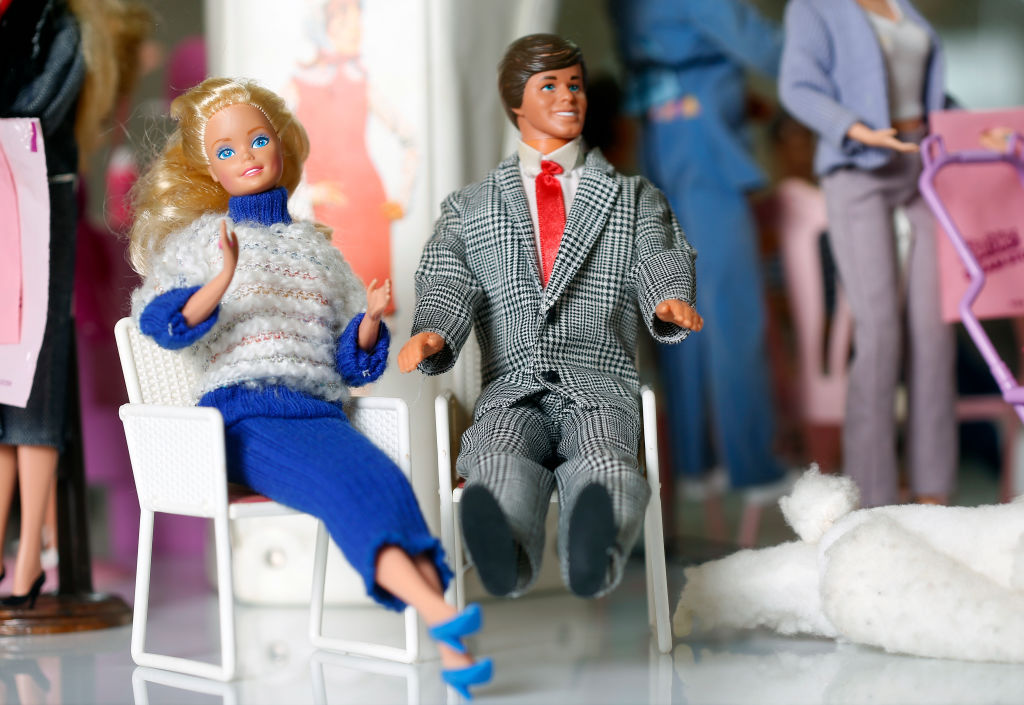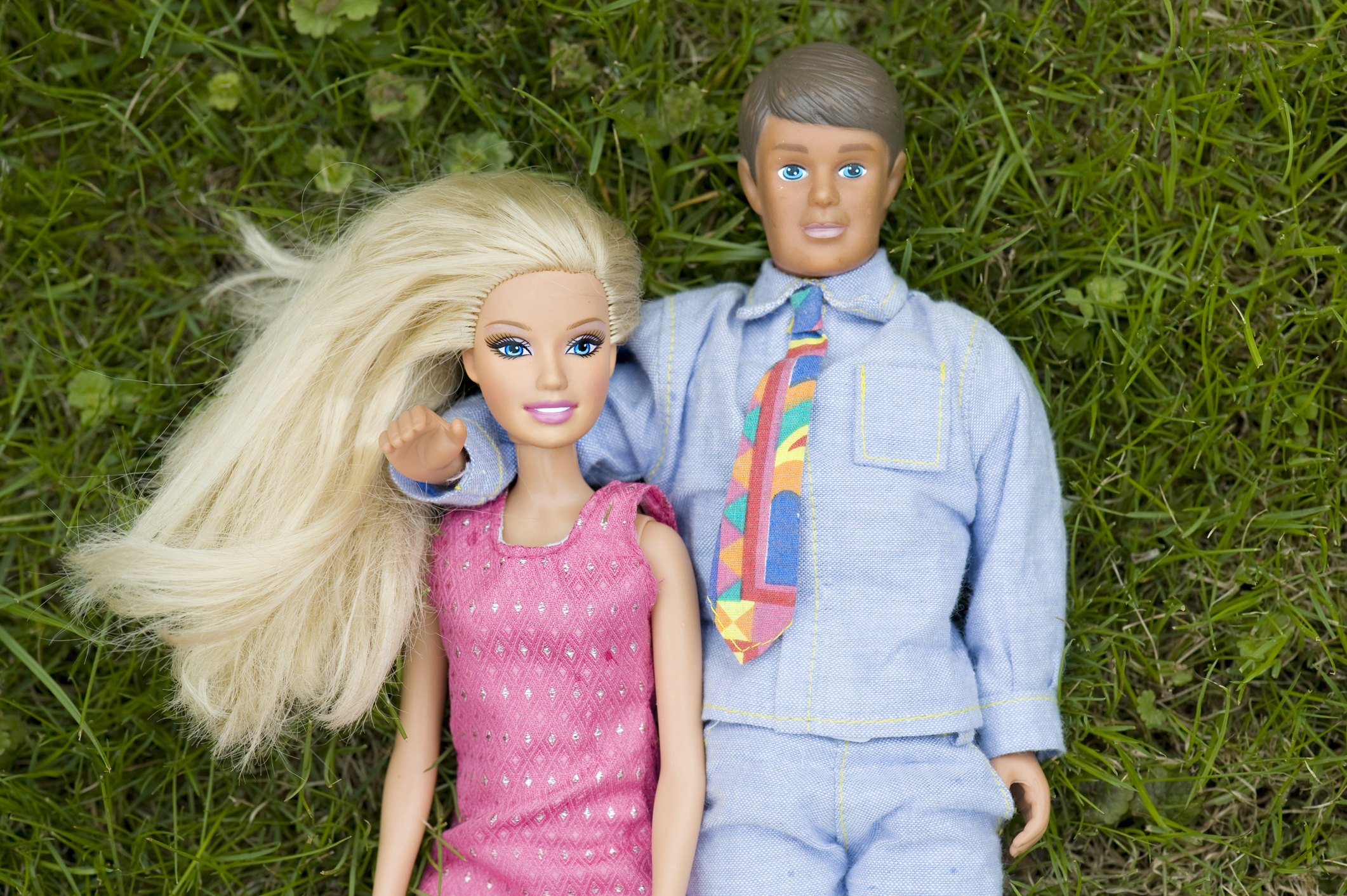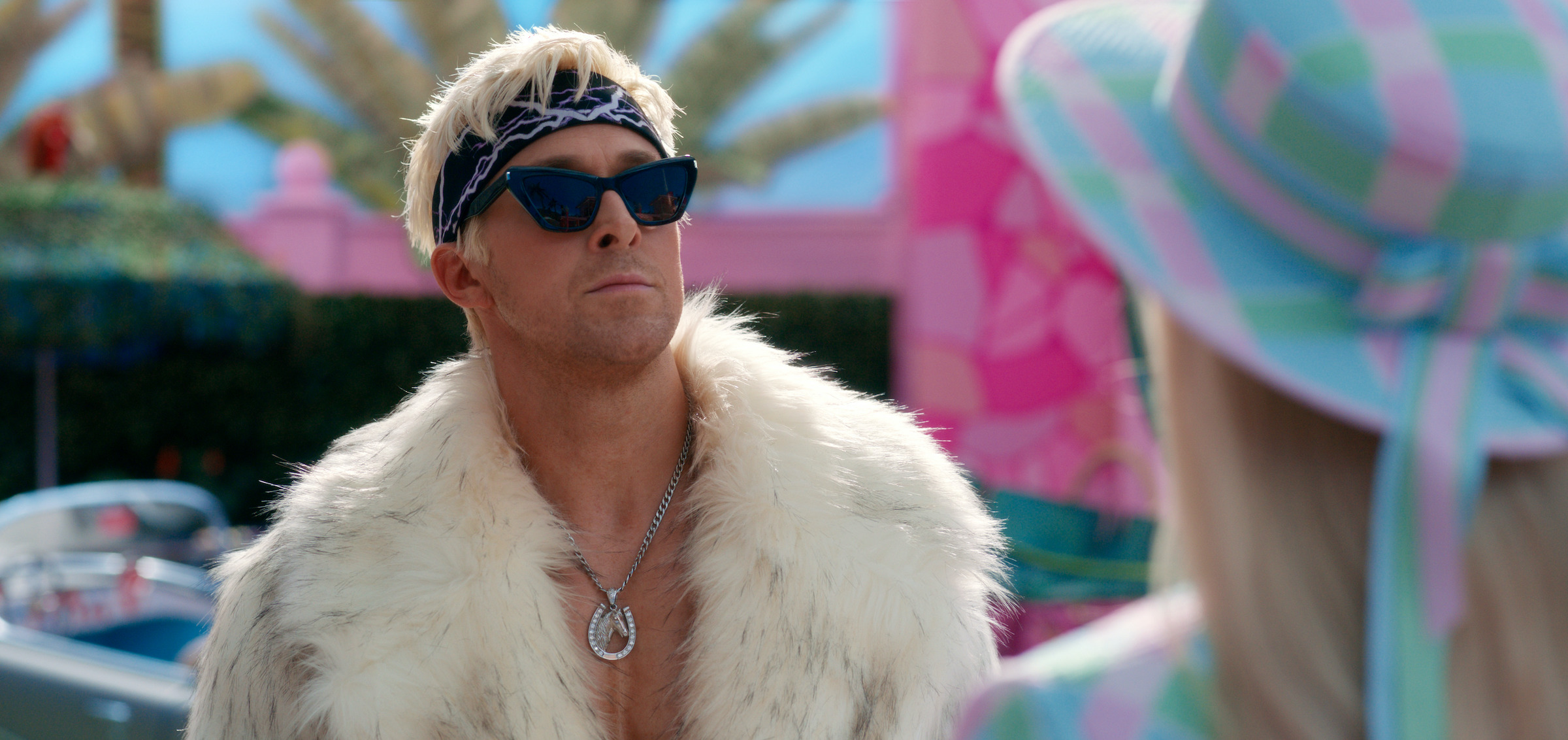In Greta Gerwig’s Barbie, Ken is just Ken. But who is Ken—or, perhaps the better question is, why is Ken? He is not the peanut butter to Barbie’s jelly. No, he’s the neon pink plate that Barbie would use while eating an impeccably made PB&J.
Ken is a piece of delicious, but wholly unnecessary arm candy for Barbie, a woman who can do it all on her own. For the last sixty-four years, she has been doing just that: holding down more than two hundred jobs, including air force pilot, robotics engineer, baby doctor, Mars explorer, and president, putting other famous multi-hyphenates to shame. All Barbie’s boyfriend does, according to Gerwig’s film, is “beach,” which, as Barbie’s über Ken Ryan Gosling has noted throughout the movie’s press tour, is a difficult occupation to define and certainly not one to brag about.
This might be why Gosling’s Ken to Margot Robbie’s Barbie is in the midst of an existential crisis. (Listen to Ken’s blonde fragility ballad “I’m Just Ken” to understand how deep the prototypical himbo’s inferiority complex runs—or, should I say, roller blades.) Barbie’s plus one has finally realized something the rest of us have known forever: it’s Barbie’s world and he’s just living in it. Before seeing Barbie, in theaters July 21, find out how Ken became the most iconic boy toy in history.
Read more: Our cover story on Barbie
When was Ken created?
Kenneth Sean Carson hit store shelves in March 1961, two years after Mattel released the first Barbie doll. Ken, who, yes, is a Pisces, was created as a male counterpart and companion to Barbie by Ruth Handler, the inventor of the iconic mononymous fashion doll. (She also founded and ran Mattel until 1975 with her husband, Elliot.) Ken was made in response to those who wrote Mattel complaining about Barbie’s singledom. “Ken was invented after Barbie, to burnish Barbie’s position in our eyes and in the world,” Gerwig told Vogue. “That kind of creation myth is the opposite of the creation myth in Genesis.”
Ken stands twelve inches tall, which is half an inch taller than Barbie. Handler and designer Charlotte Johnson wanted Ken to stand out from Barbie in other ways as well. The two advocated for Ken to have some sort of genitalia, “if no actual penis, then at least a ‘bulge’ in his trousers,” according to Esquire. “The squeamish male executives at Mattel did not” agree. Ken’s smooth groin area was the compromise the two parties reached.
More from TIME
The first Ken doll wore a red bathing suit and cork sandals despite looking as if he hadn’t spent much time in the sun. His hair, which came in blond, brown and “brownette,” was initially made of “flocked” felt, but once Mattel realized that Ken’s hair would fall off when wet they replaced his hair in 1962 with a molded plastic hairstyle. He upgraded to “rooted” or synthetic hair in 1973.
Since Ken’s release, he has had more than a hundred different looks that more often than not perfectly complement Barbie’s. Ken debuted the blonde hair and tanned physique that would become his trademark in 1979 with the release of “Sun Lovin’ Malibu Ken,” whose aqua swim trunks hide his tan lines. Three years later, Mattel released the first African-American Ken doll, but it wasn’t until 2021 that the company released its most diverse line of Ken dolls. To mark Ken’s 60th anniversary, Mattel offered Kens with a range of skin tones, body types, abilities, and man buns.
Out now: TIME’s new special edition about Barbie is available at newsstands and here online
Despite Barbie’s claims, Ken has held nearly forty jobs in his sixty-two years: astronaut, hamburger chef, country western singer, and lifeguard, to name a few. His most common occupation? Twelve Kens have held the not-so-flattering job title of “beach bum.” Perhaps, Ken’s questionable employment is why he has never had a Dream House of his own. He did finally get his own car in 2012: a red Mini Cooper with a set of vanity “Ken” license plates.

Who is the inspiration for Ken?
Ken was named after Kenneth Handler, the son of Barbie inventor Ruth Handler, whose daughter Barbara was the inspiration for Barbie. The original Ken always claimed he was nothing like his namesake toy. “Ken doll is Malibu,” he told the Los Angeles Times in 1989. “He goes to the beach and surfs. He is all these perfect American things.” As a teen, the real Ken “played the piano and went to movies with subtitles. I was a nerd—a real nerd,” he explained. “All the girls thought I was a jerk.”
According to the 2009 book Toy Monster: The Big, Bad World of Mattel, an unauthorized look at the company’s history and corporate approach, Handler reportedly “grew up embarrassed and humiliated by having an anatomically incorrect boy doll named after him … [with] no hint of genitalia.” However, Handler, who died of a brain tumor in 1994, told the L.A. Times that despite thinking Barbie was “a bimbo,” he got such a “kick” out of seeing little girls line up outside his mother-in-law’s Wyoming home in 1963 to meet the real Ken. “They were so sweet and so terrific,” he said. “It was so important to them.”
What is Ken’s relationship to Barbie?
Ken and Barbie met in 1961 while filming their first commercial together, according to Mattel. It was love at first sight and the two, who both hail from the (fictional) town of Willows, Wisconsin, started going steady. But, in the 2000s, things got a little more complicated for the couple.
After more than forty years of dating, the duo consciously uncoupled. “Like other celebrity couples, their Hollywood romance has come to an end,” Russell Arons, then vice president of marketing at Mattel, said in a 2004 statement. Barbie and Ken felt it was “time to spend some quality time apart” with Arons hinting that Ken’s reluctance to put a ring on it may have played a part in their breakup. Still, the two swore the breakup was amicable and they would remain friends. Barbie went on to date a hip-hop-loving Australian boogie boarder named Blaine.
Two years after calling it quits, Ken attempted to win Barbie back by getting a makeover. “Ken has revamped his life—mind, body, and soul,” Hollywood stylist and Mattel consultant Phillip Bloch stated in 2006. “Everyone knows how difficult it is to change, especially when you’ve lived your life a certain way for more than four decades.” Bloch described Ken’s new look as “world European,” adding that Ken “definitely wanted to be looking hot” for his ex. Barbie’s then publicist Lauren Dougherty said her client appreciated Ken’s makeover, but fans would “have to stay tuned to see whether these two will get back together.”
Sign up for Worth Your Time for weekly recommendations on what to read, watch, and listen to.
Seven years later, on Valentine’s Day, Mattel announced that the couple had gotten back together after rekindling their romance on the set of Toy Story 3. “As we like to put it, they found they were kind of missing each other,” Lisa McKnight, vice president of marketing at Mattel, told Entertainment Weekly in 2011, which marked the 50-year-anniversary of the golden couple’s first date. “They had a lot of fun together. Now a little time has passed since the shoot and all the premiere noise around the movie and all that good stuff, and I think they both realized that they’re made for each other.”
The couple are still together today and don’t appear to have any plans to settle down and start a family. The New York Times Magazine noted that the fact “that Barbie has never had a child remains one of the most radical things about her.”

What is the most famous Ken doll?
Earring Magic Ken, released in May 1993, is considered to be the most famous Ken doll—and one of the most controversial. The platinum blonde streaked Ken, who, yes, sported a silver hoop earring, was “a big breakthrough,” Lisa McKendall, the then manager of communications for Mattel, told The New York Times “We never would have done this a few years ago. But now you see more earrings on men. They are more accepted in day-to-day life. We are trying to keep Ken updated.”
At the time, author and journalist Dan Savage compared Ken’s new cool guy look—a purple pleather vest worn over a lavender mesh top with black jeans—to “three-year-old rave wear,” writing in the Seattle alt-weekly The Stranger that Mattel “spent a weekend in L.A. or New York dashing from rave to rave, taking notes and Polaroids” for inspiration. What did catch Savage’s eye though was Ken’s necklace, which, to him (and many others), looked like a certain sex toy. “We’re not in the business of putting c–k rings into the hands of little girls,” McKendall said when Savage asked about Earring Magic Ken’s possibly erotic jewelry. “It’s a necklace. It holds charms he can share with Barbie. C’mon, this is a doll designed for little girls, something like that would be entirely inappropriate.”
Savage argued that Mattel had given the world “Queer Ken.” (The first openly LGBTQ+ doll, Gay Bob, was released in 1977.) The company told him that was not their intention. “Ken and Barbie both reflect mainstream society, reflect what little girls see in their world,” McKendall told Savage in 1993. “What they see their dads, brothers, and uncles wearing, they want Ken to wear.” However, in 2021, former Mattel employee Carol Spencer told Mel magazine that, at the time, the designers of the doll were well aware that Ken’s more flamboyant look would lead some to question his sexuality. “I do recall the male Mattel designer—who was married with several children and working on the project—saying to me: ‘They will turn Ken gay with this doll!’”
Mattel discontinued Earring Magic Ken after six months, but the doll became particularly popular with LGBTQ+ collectors. It is said to be the best-selling Ken doll in Mattel’s history with some claiming that it is the best selling Barbie doll of all time. (Mattel has seemingly disowned the controversial Ken doll; it’s not listed on Barbie’s official archive, which makes it difficult to fact-check the claims of its popularity.) Of course, this only adds to the lore of Ken and his magic earring. After 30 years, in 2022, Dazed declared that Gosling’s Barbie look “represents the ultimate vindication of Magic Earring Ken,” who has become a symbol of LGBTQ+ pride and brand failure.
What is the most infamous Ken doll?
Sugar Daddy Ken. Released in 2010, the $82 doll was part of the Barbie Collector line aimed at adults, and, according to Mattel, “exemplifies fantastic Palm Beach fashion.” This Ken is significantly older than his predecessors—check out his gray coif!—and much more dapper with his preppy lime green jacquard blazer, pink polo, and white pleated slacks. His look was inspired by photographer Slim Aarons’ “Palm Beach Party” images, which often featured tanned socialites hanging out in the South Florida town. But it’s Sugar Daddy Ken’s West Highland Terrier that completes his look.
Despite what some may think, this Ken’s name is not a reference to older wealthy men who take up with younger lovers, but to his toy dog companion, Sugar. He’s Sugar’s daddy, get it? Most people didn’t, which might be why Gerwig chose to enlist this particular Ken (played by Rob Brydon) for a very funny Barbie cameo.
Where is Ken now?
Thanks to Barbie, Ken has been given a major glow up. Gosling is just one of many actors who gets to show off his “Ken-ergy,” a fitting term for the mysterious aura that each Ken possesses. Simu Liu, Ncuti Gatwa, Kingsley Ben-Adir, and Scott Evans are also members of the film’s Ken-munity. (Michael Cera plays Ken’s mostly forgotten BFF Allan.) Gosling and Liu each got Barbie dolls made in their Barbie likenesses that some have argued don’t look that much like them. While not a total Ken-tastrophe, it does feel par for the course when it comes to the doll that has always been an afterthought.
But Gosling seems hellbent on changing the world’s opinion of Ken, launching a one man #JusticeForKen campaign in the lead-up to the movie’s release. He told GQ that while contemplating whether he would sign on to Barbie, he actually found his daughters’ Ken doll “face down in the mud outside one day, next to a squished lemon and it was like, This guy’s story does need to be told, you know?” He’s spoken out against the hypocrisy that popped up online after some argued that he was too old to play Ken. “Suddenly, it’s like, ‘No, we’ve cared about Ken this whole time,’” Gosling said about the burgeoning #NotMyKen movement. “If you ever really cared about Ken, you would know that nobody cared about Ken. So your hypocrisy is exposed. This is why his story must be told.” With Barbie, Gosling attempts to do the impossible: prove that while Ken certainly isn’t Barbie, he’s always been just Ken-ough.
More Must-Reads from TIME
- Introducing the 2024 TIME100 Next
- The Reinvention of J.D. Vance
- How to Survive Election Season Without Losing Your Mind
- Welcome to the Golden Age of Scams
- Did the Pandemic Break Our Brains?
- The Many Lives of Jack Antonoff
- 33 True Crime Documentaries That Shaped the Genre
- Why Gut Health Issues Are More Common in Women
Contact us at letters@time.com
